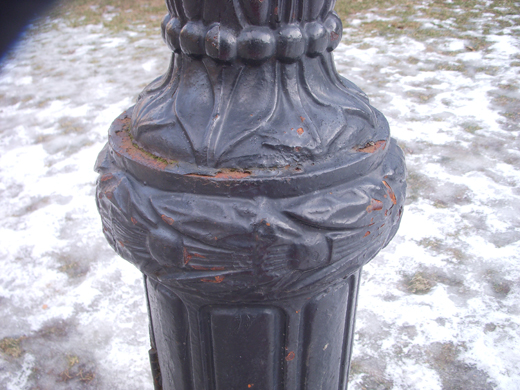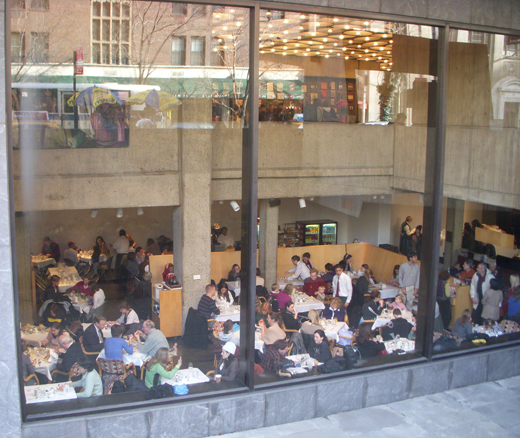
There ought to be a ban on plays, concerts, and whatnot during the first two months of the new year. Then Kathleen and I wouldn’t miss anything because we were too depressed by the ghastly weather to venture forth in the evening. As it happens, we didn’t miss anything this week, but we trudged off to the Oak Room on Thursday night, and to Carnegie Hall last night, with very reluctant footsteps.
We knew from experience that we’d be glad we’d gone, in the one instance to hear cabaret singer Steve Ross, in the other to hear Orpheus and Anoushka Shankar, and we were. They were great evenings out. But they would have been more fun if we hadn’t been wishing like mad that we could just stay home.
(Moving to warmer climes is not an option. There are no Steve Rosses or Orphei in the Sun Belt.)
Now I have the pleasure of writing up these events for your reading pleasure. Don’t hold your breath; I’m in the middle of a rethink about writing about music.
***
Getting used to life after Dubya is an interesting pleasure. It’s great to return to a more genuinely political world, one in which contestants engage in argument with one another instead of spouting ideological non-responses. So far, it’s true, the Republicans, at least the ones in Congress, are not “contestants” but “constipants.” More about that anon.
Peter Steinfels wrote today about Catholic bishops in the United States — and how they haven’t said “boo” about Benedict XVI’s rehabilitation of the Lefevrists, including a notorious Holocaust-denier. I haven’t said “boo,” either. There really isn’t much to say, at this point, about the future of the Roman Catholic Church. One can only wait and see what individual American Catholics will decide, soul by soul.
I am waiting for the members of some aggrieved parish or other to respond to a church closing by contesting diocesan title to church buildings. The law is squarely on the bishops’ side, but the equity just as certainly is not, especially when one considers that many of the Church’s money problems stem from the hierarchy’s high-handed coverups of its pedophile problem. Who ought to suffer? Parishioners or bean-counting bishops?
If there’s a precedent for the impending rupture, it is not the Protestant Reformation, which concerned profound doctrinal differences, but the split between Reform and Orthodox Jews, which concerned differences about how much weight to put on doctrines that were not in dispute.
***
The other big deal at the moment is — what to call it? Gaza? Israel? Palestine? It sometimes seems that Hitler had the last laugh after all, for the fear of another Holocaust (the only conceivable justification for the harrowing of Gaza) provokes Israeli responses that, in turn, provoke ever more generalized anti-Zionism; and anti-Zionism, as Bernard-Henri Lévy assures us, is but anti-Semitism by another name.
***
What’s not particularly amusing these days is enduring the utterly hypocritical explosion of populism. — Those greedy bankers! &c &c. But no one capable of using a search engine has the right to start complaining now about what has been going on in American finance since at least the collapse of Enron. And before smacking any of those greedy bankers, let justice to be done to the cheerleaders who encouraged them, Alan Greenspan and the editorial-page editors of the Wall Street Journal.
***
The Schott’s Miscellany calendar entry for last Wednesday, “Applause at Classical Concerts,” addresses a felicitous problem. The fact that many concertgoers don’t seem to know the rules about applause is encouraging: it means that serious music is finding new audiences. Now, I’m the first to forget my manners when the first movement of a stormy concerto comes to a rousing conclusion. Clap away! (And glare right back at those blue-haired biddies  — it’s amazing that they still make ’em, ain’t it — and their dim husbands.)
At the Orpheus concert last night however, it appeared that many people in the cheap seats thought that it was only polite to clap every time the music came to a stop. This completely broke the spell of Zoltán Kodály’s Summer Evening and gave the ensemble’s excellent performance of Haydn’s 99th Symphony something of a junior high feel. It’s time for someone to post a small “Attention New Listeners!” notice at the bottom of the programs. For nothing is sadder at concerts than polite applause.




















